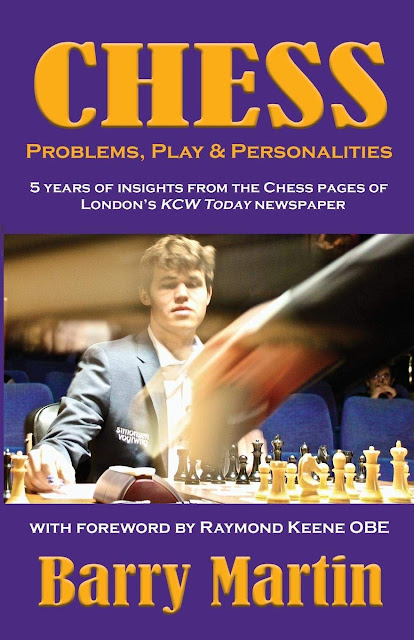Why did nobody tell me about this
major publishing event?
Who's Barry Martin? He's a minor figure in the history of British art over the past half-century but a relatively
major figure in the history of Ray Keene's circle of friends and cronies. He also has an interest in chess, and this combination - Ray, art and chess - is nicely illustrated by
this book cover from a decade or so back.
Apparently Barry writes a chess column in his local paper. I say "apparently" not because I doubt its existence, but because I doubt its relevance, given that the only person I have ever seen refer to this column is Ray himself. Fitting, then, that Ray and Barry should continue their collaboration with a
book compiled from Barry's columns, of which Ray himself is the only known reader. It is available in all good bookshops, says the ad. I think I need to say "apparently" again.
There's an
introduction by your friend and mine, promising that
On the back cover, we see Barry in play against a vital link to the chess art traditions of the past, his opponent being Marcel Duchamp’s widow, Mme Teeny Duchamp herself
which judging by what I can see on
Amazon, may not be a promise fulfilled.
Among the other tendentious claims made by our normally reliable guide is that Barry
has also gained a world chess ranking. In Duchamp's time, such ratings had not been invented, so Barry is the only artist on the planet who has achieved this accolade.
Your suggestions are invited for candidates who would disprove this assertion. So, indeed is your assistance in demonstrating that Barry possesses such a thing, since I can't
locate one. (Maybe he had one in the past. No doubt he did, for if this is not about living in the past, what is?)
Ray also tells us:
the theme of chess, of course, is a prominent thread throughout his oeuvre, ranging from the biodegradable potato chess set
I would genuinely like to know more about this set - I've come across it mentioned before, and wanted to write about it
through portraits distributed by The Times of Garry Kasparov and Nigel Short.
Well well, it's Nigel again. That's
right about the
portrait, mind, and Nigel crops up at the artist's launch -
Chess stars flock to Barry Martin's book launch, it says
here.
Nigel in company
Funny, it seems these days that every
time you come across one of Nigel or Ray, you come across the
other too.





























